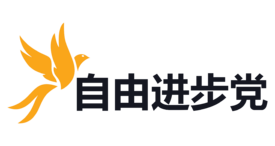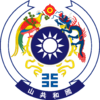Liberal Party of Monsilva
Liberal Party of Monsilva 山国自由进步党 (Shānguó Zìyóu Jìnbùdǎng) | |
|---|---|
 | |
| Leader | Gao Jingyi |
| Opposition Senate Leader | Li She |
| Founded | July 1958 |
| Split from | Freedom and Democracy Party |
| Headquarters | Liberal Party Headquarters 38 Heping Street, Luhai City, Luhai 02073[1] |
| Membership (2022) | |
| Ideology |
|
| Political position | Centre |
| National affiliation | Liberal Parties Agreement |
| Colours | Yellow |
| Slogan | "最好的口才是把事情做好的口才。" ("The finest eloquence is that which gets things done.") |
| Legislative Assembly | 81 / 510
|
| Senate | 15 / 85
|
| State Parliament members | 151 / 1,260
|
| This article is part of a series on the |
| Politics of Monsilva |
|---|
 |
The Liberal Party of Monsilva (Monsilvan: 山国自由进步党, Pinyin: Shānguó Zìyóu Jìnbùdǎng, lit. "Monsilvan Liberal Progressive Party") is one of the three main parties in the Monsilvan Republic, along with the RNP and the FDP. It has been an opposition party, and the third largest party in parliament since the 1980 general election. The first Liberal president, Ling Mu won the 2003 Monsilvan presidential election, becoming the first Liberal Party president. Ling served one term and was defeated by Chiu Zan in the 2008 Monsilvan presidential election. Before that, the only time when the Liberal party had served in parliament was during the 1996/00 FDP-Liberal Coalition. During this coalition, the Liberal Party leader, Kong Tsai, who was serving as deputy prime minister, served as prime minister from August 1999 to March 2000 due to Suen Shi-huang falling ill in July 1999. Kong was forced to resign in March 2000 after Suen returned and had him removed after the Presidential Veto Act incident. The party is at the centre of the political spectrum, and encompasses various ideological factions, with mostly similar views, but with some members leaning more towards liberal conservative politics and others remaining more towards the liberal left. The party currently has 81 Members of the Legislative Assembly, 15 Senators and 151 State Parliament members. In 2024, the party entered an association agreement with the Progressive Party of Shaoyu, similar to its existing one with the Luhai First Party, whereby the Liberal Party would not run any candidates in Shaoyu as long as the Progressive Party followed the Liberal Party's core ideals. As a part of this agreement, they are not in a formal coalition together, but are instead listed under the 'Liberal Parties Agreement' in the Legislative Assembly and Senate. Members of the Liberal Party of Monsilva are often referred to as "Liberals" or "自由人".
Contents
History
The Liberal Party was founded in July 1958 having been a faction within the People's Culture Party, the predecessor to the Freedom and Democracy Party, after the ideology of the party was beginning to lean more towards social democracy and away from liberalism. The Liberal Party saw limited success, failing to gain a single seat in parliament during the Kingdom of Monsilva. However, the Liberal Party did gain members throughout its time as a party not in parliament, and had much support throughout the 60s, with massive increases in membership during the 1970s. After the 1978 Monsilvan protests, some Liberal Party politicians were invited to the Provisional government of Monsilva and assisted the establishment of the republic after the successful referendum on the monarchy. The first election under the new form of government was the 1980 general election, which was also the first election in which the Liberal Party won any seats.
The Liberal Party has never been the largest party in parliament, and has remained the third largest party since its entrance into parliament in 1980. However, it did have time in government in a coalition with the Freedom and Democracy Party after the 1996 federal election, where the FDP won the most seats but failed a to reach a majority. When Suen Shi-huang, leader of the FDP at the time, approached Kong Tsai, who was leader of the Liberal Party, to form a coalition, he initially stated he was unsure, but after a week of discussions, they came to an agreement and formed a coalition which lasted until August 1999, when Suen became ill, and Kong Tsai took over without election as interim. During his time as interim prime minister, he tried to pass many legislations that were against the FDP agenda. One of these included the removal of presidential veto. However, after it was announced that the act to remove presidential veto was going to be approved by the senate, a large petition began to prevent the act from passing. In early March 2000, the petition had reached over 14 million signatures. When the act was given to the president, Guo Ming-chen, he vetoed it. This is the first and, as of 2023, the only time a president has used their veto powers.
Later in the month, Suen Shi-huang returned to his position as prime minister. Almost immediately after returning, Kong Tsai was dismissed by the cabinet, and the next day, Guo Ming-chen resigned as president, triggering a candidate election. After the 2000 federal election, although lead by a different person, the Liberal Party lost a lot of the popular vote, likely due to the incident earlier in the year. However, in the 2004 and 2006 federal elections, the new leader, Cai Chuang, gained enough support to regain all of the party's lost seats, as well as an extra 23 seats.
Policy
In recent elections, the Liberal Party has seen an incredible increase to their popularity. As of December 2022, the Liberal Party currently ranks second in the polls for the next election, which is the first time a poll has ranked the party any higher than third, it is also the first time the third largest party has been polled higher than the incumbent government. In 2023, the current leader of the Liberal Party of Monsilva, Gao Jingyi, announced they would be "focusing on becoming worthy of being the next official opposition party or even the next government", as opposed to their previous goals of "maintaining third place and putting pressure on governments for the benefit of the people".
The party has generally shown approval and had a positive stance on economic liberalism, promoting the free market whilst still having a strong agenda on wealth inequality. The party has also strongly supported improvements to social welfare in Monsilva and is usually one of the first parties to criticize the incumbent government on social issues. The party has an official stance of being for the Ostlandet Union (OU) and often supports further integration of Monsilva into the union.
See also
- Federal government of Monsilva
- Reformed National Party (Monsilva)
- Freedom and Democracy Party (Monsilva)
- Politics of Monsilva
- List of political parties in Monsilva
Notes
- ↑ See also: Postal codes in Monsilva